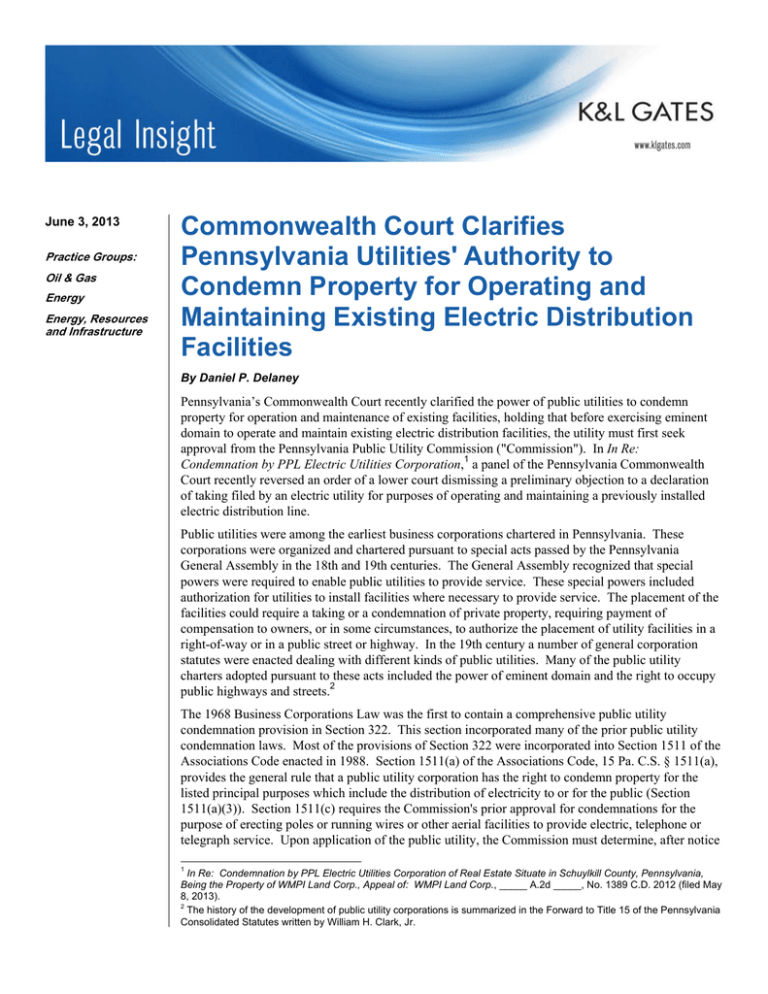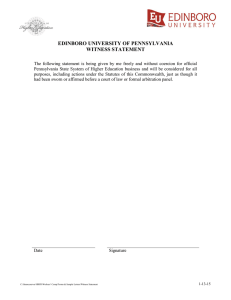Commonwealth Court Clarifies Pennsylvania Utilities' Authority to Condemn Property for Operating and
advertisement

June 3, 2013 Practice Groups: Oil & Gas Energy Energy, Resources and Infrastructure Commonwealth Court Clarifies Pennsylvania Utilities' Authority to Condemn Property for Operating and Maintaining Existing Electric Distribution Facilities By Daniel P. Delaney Pennsylvania’s Commonwealth Court recently clarified the power of public utilities to condemn property for operation and maintenance of existing facilities, holding that before exercising eminent domain to operate and maintain existing electric distribution facilities, the utility must first seek approval from the Pennsylvania Public Utility Commission ("Commission"). In In Re: Condemnation by PPL Electric Utilities Corporation,1 a panel of the Pennsylvania Commonwealth Court recently reversed an order of a lower court dismissing a preliminary objection to a declaration of taking filed by an electric utility for purposes of operating and maintaining a previously installed electric distribution line. Public utilities were among the earliest business corporations chartered in Pennsylvania. These corporations were organized and chartered pursuant to special acts passed by the Pennsylvania General Assembly in the 18th and 19th centuries. The General Assembly recognized that special powers were required to enable public utilities to provide service. These special powers included authorization for utilities to install facilities where necessary to provide service. The placement of the facilities could require a taking or a condemnation of private property, requiring payment of compensation to owners, or in some circumstances, to authorize the placement of utility facilities in a right-of-way or in a public street or highway. In the 19th century a number of general corporation statutes were enacted dealing with different kinds of public utilities. Many of the public utility charters adopted pursuant to these acts included the power of eminent domain and the right to occupy public highways and streets.2 The 1968 Business Corporations Law was the first to contain a comprehensive public utility condemnation provision in Section 322. This section incorporated many of the prior public utility condemnation laws. Most of the provisions of Section 322 were incorporated into Section 1511 of the Associations Code enacted in 1988. Section 1511(a) of the Associations Code, 15 Pa. C.S. § 1511(a), provides the general rule that a public utility corporation has the right to condemn property for the listed principal purposes which include the distribution of electricity to or for the public (Section 1511(a)(3)). Section 1511(c) requires the Commission's prior approval for condemnations for the purpose of erecting poles or running wires or other aerial facilities to provide electric, telephone or telegraph service. Upon application of the public utility, the Commission must determine, after notice 1 In Re: Condemnation by PPL Electric Utilities Corporation of Real Estate Situate in Schuylkill County, Pennsylvania, Being the Property of WMPI Land Corp., Appeal of: WMPI Land Corp., _____ A.2d _____, No. 1389 C.D. 2012 (filed May 8, 2013). 2 The history of the development of public utility corporations is summarized in the Forward to Title 15 of the Pennsylvania Consolidated Statutes written by William H. Clark, Jr. Commonwealth Court Clarifies Pennsylvania Utilities' Authority to Condemn Property for Operating and Maintaining Existing Electric Distribution Facilities and opportunity for hearing, that the service to be furnished by the utility through the exercise of eminent domain is necessary or proper for the service, accommodation, convenience or safety of the public. The appellant before the Commonwealth Court was WMPI Land Corp. ("WMPI"), a Pennsylvania corporation engaged in leasing land for coal mining operations and the owner of land in the Borough of Gilberton, Schuylkill County, Pennsylvania. Electric distribution facilities consisting of poles and an overhead power line had been previously installed on WMPI's property by PPL Electric Utilities Corporation ("PPL") pursuant to an expired right-of-way agreement between WMPI's predecessor in title and Pennsylvania Power and Light, now, PPL. PPL filed a Declaration of Taking in the lower court pursuant to Section 1511(a)(3) of the Associations Code. The Declaration stated that PPL was taking a perpetual interest and right-of-way in WMPI's property which included the rights to reconstruct overhead and underground electric distribution lines, install towers and poles, fiber optic facilities, fixtures and apparatus above and below the ground, and the right to remove any buildings or structures from the property. WMPI filed preliminary objections to the Declaration, stating inter alia that PPL did not comply with the procedural requirements set forth in Section 1511(c) of the Associations Code by failing to obtain approval from the Commission prior to filing the Declaration of Taking, and PPL's failure to do so nullified the Declaration and required its dismissal. After oral argument, the lower court overruled the preliminary objections, holding that PPL was not taking WMPI's land for the purpose of erecting new facilities but rather for the purpose of operating and maintaining existing lines and facilities for the distribution of electricity. The Court accepted PPL's argument that compliance with Section 1511(c) was not required in cases where an electric utility condemned property for the purpose of operating and maintaining existing lines and facilities for the distribution of electricity. On appeal, WMPI argued that permitting PPL to condemn the property without Commission approval violated Section 1511(c) and that the required Commission approval was not limited to the construction of new facilities. PPL argued in reply that the Commission's regulations concerning transmission and high voltage lines supported PPL's argument that approval was not required when an electric utility sought to condemn land where only existing facilities were involved. Since the Commission's regulations addressed only the review and approval of applications associated with high voltage transmission facilities, PPL argued that the regulations supported PPL's interpretation that Section 1511(c)'s requirement of prior Commission approval did not apply when only existing distribution facilities were involved. The Commonwealth Court rejected PPL's arguments that condemning property for the purposes of maintaining existing electric distribution facilities did not require the Commission's approval under Section 1511(c). Initially the Court noted that legislation conferring the right to exercise eminent domain must be applied in a manner that is limited to the powers expressly stated in the legislation and that the granted power to condemn property must be strictly construed.3 The Court also noted that PPL's arguments that its present intentions were to only maintain existing facilities were inconsistent with its expansive Declaration of Taking which proposed to authorize PPL to construct, operate and reconstruct overhead and underground distribution lines, poles, towers, guys, cables, wires and fiber optics both above and below the ground and to remove any buildings or structures from the property. The Court concluded that the fact that the Commission had promulgated regulations and interim guidelines for the approvals of high voltage facilities did not provide any guidance concerning the 3 Citing Township of Millcreek v. Angela Cres Trust of June 25, 1998, 25 A.3d 1288, 1292 (Pa. Cmwlth. 2011) and Olson v. Whitpain Township, 595 A.2d 706, 708 (Pa. Cmwlth. 1991). 2 Commonwealth Court Clarifies Pennsylvania Utilities' Authority to Condemn Property for Operating and Maintaining Existing Electric Distribution Facilities Commission's approach to eminent domain applications involving existing distribution facilities. Holding that it must strictly construe eminent domain statutes pursuant to its prior decisions, the Court concluded that PPL must comply with Section 1511(c) and obtain Commission approval before initiating condemnation proceedings involving WMPI's property. The Commonwealth Court decision suggests that the provisions and requirements of Section 1511 will be strictly construed by the courts which will not recognize implied powers in the section for additional authority to condemn property. Under this Commonwealth Court decision, the requirements of Section 1511(c) requiring the Commission's prior approval for condemnations for the purpose of erecting poles or running aerial wires apply even if the action is filed for the purpose of operating and maintaining existing electric distribution facilities which had been previously installed pursuant to an expired right-of-way agreement. We note that since Commonwealth Court is only an intermediate appellate court, the potential exists that this is not the last word on the subject, and that this issue may ultimately need to be decided by the Pennsylvania Supreme Court. Author: Daniel P. Delaney dan.delaney@klgates.com +1.717.231.4516 Anchorage Austin Beijing Berlin Boston Brisbane Brussels Charleston Charlotte Chicago Dallas Doha Dubai Fort Worth Frankfurt Harrisburg Hong Kong Houston London Los Angeles Melbourne Miami Milan Moscow Newark New York Orange County Palo Alto Paris Perth Pittsburgh Portland Raleigh Research Triangle Park San Diego San Francisco São Paulo Seattle Seoul Shanghai Singapore Spokane Sydney Taipei Tokyo Warsaw Washington, D.C. Wilmington K&L Gates practices out of 48 fully integrated offices located in the United States, Asia, Australia, Europe, the Middle East and South America and represents leading global corporations, growth and middle-market companies, capital markets participants and entrepreneurs in every major industry group as well as public sector entities, educational institutions, philanthropic organizations and individuals. For more information about K&L Gates or its locations, practices and registrations, visit www.klgates.com. This publication is for informational purposes and does not contain or convey legal advice. The information herein should not be used or relied upon in regard to any particular facts or circumstances without first consulting a lawyer. ©2013 K&L Gates LLP. All Rights Reserved. 3






